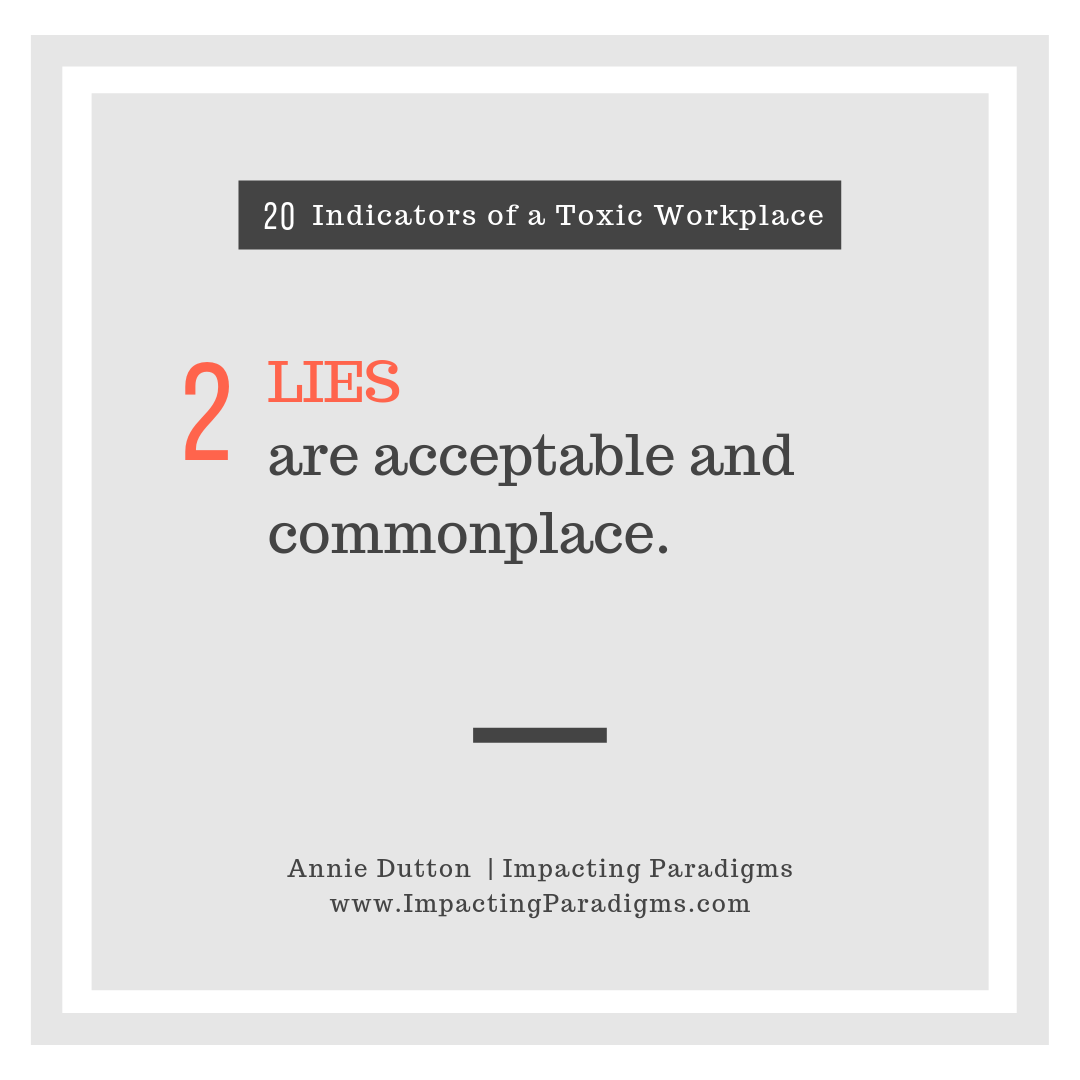We live in a culture where progress at work often comes in the form of a “better job grade” or “title”. We get a sense of power and importance from these. Sometimes we “lord” it over those “below” us. A new title or job grade can be an indicator of growth – a stepping stone. However, too often subjective and arbitrary decision making is applied to giving these in inconsistent ways, which results in people being de-valued when they are “looked over”. We limit how many people can be assigned a particular job grade / title. Yet, we still tell everyone to “be a leader”. We just refuse to formally acknowledge that they are valued as a leader. And, sometimes create cultures where some “job grades” don’t associate or respond to “other job grades”. How is an employee supposed to reconcile this contradictory message?
20 Indicators of a Toxic Workplace
It sounds odd to identify lying as something that is common at some places of work. Withholding information, directing others down incorrect paths, “fudging” numbers / information, and playing multiple sides of a situation are all ways deception can happen at work. These actions erode trust. They also decrease service / product quality, which results in lower revenues.
20 Indicators of a Toxic Workplace
Micromanagement is an effective method when partnered with the appropriate activity. As a leadership style, it stifles creativity, erodes trust, and increases anxiety / fear. This can create a cycle because it can be used as a response to fear.
Hiring can betray trust
As long as a company hires people with the intent of being able to lay them off at any point in time, the company culture will always experience trust issues and internal competition. This is because the very foundation upon which people are hired is one that betrays trust and treats a person as a commodity vs. as a member of the human race.
Building Trust
How do you foster trust?
- Own your contribution to an issue / mistake.
- Do what you are responsible for as best as you can.
- Acknowledge and leverage the strengths of those you work with.
- When issues arise / mistakes happen and are acknowledged, course correct.
- When unsure about something said or done by another person, go to them first to discuss (being curious without blaming can be very effective).
- Hire leaders who possess and know how to identify high integrity in others / Do not accept leaders who break integrity.
- Be truthful (this does not mean “brutally honest” but delivering and communicating with “accuracy and rightness”).
Destroying Trust
Here are a few ways that trust can be eroded:
- Sugar coating information.
- Discounting skills and talents of those you work with.
- Blaming others when something does not go as planned.
- Speaking negatively about others when they are not around.
- Keeping pertinent information to oneself vs. sharing broadly.
- Breaking commitments without early and clear explanations.
- Making presumptions about others without sincerely listening to them.
- Being focused on winning at all costs / being determined to get even with someone.
- Not recognizing when you are excluding someone / justifying when you exclude someone.
Dog fights at work
A little over ten years ago, there were headlines covering an NFL player’s indictment on charges of dog fighting and brutality. There was righteous outrage across the country (as there should have been).
Too often the policies and procedures we use to measure and evaluate our people enable a form of “dog fights” at work. Physical violence isn’t the symptom, but behaviors such as favoritism and political maneuvering are the symptoms and result in:
· Promotions of people who are not qualified and who treat others badly
· Bonuses being awarded to those who have not fully earned them, while those who have worked very hard getting overlooked
· Credit being taken by people without fully acknowledging those who contributed
These (and other) actions are difficult to stop and are actually encouraged as a way to survive at work. The first step to correcting the policies and procedures is to recognize that these behaviors exists and determine if we want to do better. It shouldn’t take us as leaders being a causality before we are willing to speak up.
Forced distribution
I believe that forced distribution of people not only obstructs achievement of collaboration and of the organizations's goals, but it is demeaning to your people. However, this is how many companies still choose to measure their people.
As such, a couple of years ago, I was sitting in a room of managers during a calibration meeting. An employee who was hard working, accurate and consistently went above and beyond was being discussed. This employee's manager said she should be rated a 1 (on a scale from 1 to 4 where 1 is best). A skip level manager said that she should be rated a 2 because: she was rated 1 the prior year, the standard for her should be higher, and she had been in that role for a while.
When we allow these types of people measurements to reign, we create environments that demean, discourage and incubates unhealthy alliances. When work becomes about survival, trust is eroded, and the best that people can do make take a back seat.




